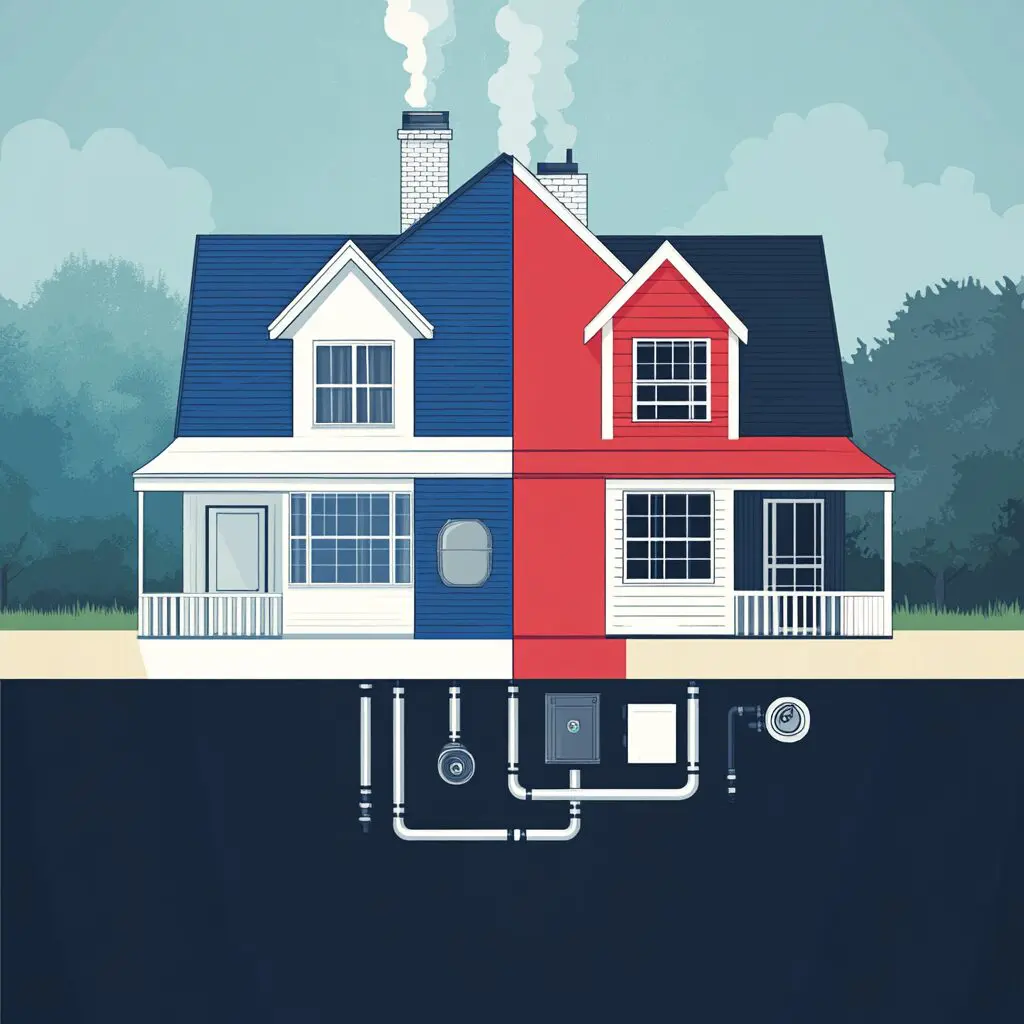- Serving The Fraser Valley & Lower Mainland
- Gas – LGA0103126
- Refrigeration – LBP0001017
- Boiler – LBP0204397
24hr Emergency Service
Click to Call Dispatch
Click to Call Dispatch

For homeowners in British Columbia’s Fraser Valley, the choice between a heat pump and a furnace is more than just a technical decision—it’s about year-round comfort, energy efficiency, and adapting to a climate known for both damp winters and warm summer spells. If you’re building a new home or considering an HVAC upgrade, understanding the real-world performance of these systems is essential.
This guide compares heat pumps and furnaces specifically for British Columbia’s residential climate needs. Drawing on Alpine Refrigeration’s local expertise in Abbotsford, Chilliwack, and Agassiz, we’ll explain how each system works, where it excels, and what you should consider before making a decision.
A heat pump is a two-in-one system that provides both heating and cooling. Unlike a furnace that generates heat, a heat pump works by transferring it. During the winter, it extracts warmth from the outdoor air and brings it inside; in summer, it reverses this process to cool your home. This makes it an attractive option for areas like the Fraser Valley, where temperatures rarely plunge below -15°C.
There are various types of heat pumps, including air-source, ground-source (geothermal), ducted systems, and ductless mini-splits. The most commonly used in our region is the air-source heat pump, especially those with cold-climate ratings.
A furnace, by contrast, is a heating-only system. It uses either electricity or natural gas to generate heat, which is then distributed throughout your home via ductwork. Furnaces can be powerful and reliable, especially in consistently cold regions. To cool a home, furnaces must be paired with a separate air conditioner.
Air-source heat pumps are increasingly popular in the Fraser Valley because they provide both heating and cooling with a single system, ideal for our region’s moderate winters and warming summers.
British Columbia’s Lower Mainland may not see prairie-level deep freezes, but winter still brings cold mornings, damp evenings, and prolonged heating needs. Furnaces offer high heat output and can quickly warm a home regardless of how low the temperature drops. Gas furnaces remain effective even below -20°C.
Heat pumps, however, have come a long way. Thanks to modern engineering and features like variable-speed compressors, many cold-climate heat pumps now operate effectively in temperatures as low as -25°C. In most Fraser Valley neighbourhoods, they perform reliably throughout winter. In especially chilly weeks, some systems incorporate electric backup heat or are installed as part of a dual-fuel system alongside a gas furnace.
If you live in a home that already has a gas furnace, adding a heat pump as a primary source of heat can reduce your gas usage significantly. The furnace can still serve as backup on the coldest days.
With summer temperatures rising across the Fraser Valley, more homeowners are installing air conditioning for the first time. Here, the heat pump’s versatility is a major advantage. It offers central cooling as part of a single system. That means no additional A/C unit is required, and you’ll enjoy consistent, efficient cooling and dehumidification during summer months.
A furnace, on the other hand, provides no cooling function. If air conditioning is needed, it requires the installation of a separate system, which increases both installation costs and long-term maintenance requirements.

Heat pumps are widely recognized for their energy efficiency. Because they transfer heat instead of generating it, they can achieve efficiency ratings of 200% to 300% under optimal conditions. This means they deliver two to three times more energy than they consume.
In contrast, modern gas furnaces can achieve efficiencies of up to 98% AFUE (Annual Fuel Utilization Efficiency), which is impressive. However, they’re still fundamentally limited by the need to burn fuel to produce heat. And as natural gas prices fluctuate—and trend upward over time—operating costs can rise accordingly.
BC Hydro's electricity is primarily sourced from hydro power, which is both cost-effective and renewable. This makes heat pumps especially appealing from both a financial and environmental standpoint.
The best system for your home may also depend on what’s already in place. If your home has ductwork, you can choose either a furnace or a central heat pump. If you don’t, installing ductless mini-split heat pumps may be more practical than retrofitting an entire ducted system.
While heat pumps tend to have higher upfront installation costs, they can replace both your furnace and air conditioner, leading to long-term savings and simplified maintenance. Add in the generous rebates currently available through BC Hydro, FortisBC, and CleanBC Better Homes, and the financial gap narrows considerably.
Many Fraser Valley homeowners are receiving $6,000 or more in rebates when switching to a qualifying heat pump system.
Comfort goes beyond just temperature. Heat pumps provide steady, even heating and avoid the dry, intense airflow common with older gas furnaces. They also integrate easily with modern ventilation and air filtration systems, making them a good choice for homeowners sensitive to dust, allergens, or dry air.
Furnaces, while powerful, may lead to temperature fluctuations and reduced humidity, especially if ductwork is outdated or poorly sealed. However, they can also be integrated with air filtration upgrades when installed by experienced professionals.

Reducing household emissions is a growing priority for many families. Heat pumps represent a significant step in that direction. Because they rely on electricity (and in BC, that’s mostly hydroelectric), they produce minimal direct greenhouse gas emissions.
Natural gas furnaces, even high-efficiency models, still produce carbon emissions during operation. For those aiming to align their home systems with sustainability goals or future provincial targets, the heat pump is clearly the greener choice.
Many municipalities in the Fraser Valley are already incentivizing heat pump installations as part of their climate adaptation strategies. Upgrading now can help future-proof your home.
The best system depends on your home, your existing setup, and your priorities. If you’re primarily concerned about upfront cost, and your home already has gas service, a high-efficiency furnace could make sense. But if you’re looking for year-round comfort, energy efficiency, and a smaller environmental footprint, a cold-climate heat pump is likely the better long-term investment.
For many Fraser Valley homeowners, a dual-fuel solution—where a heat pump handles day-to-day comfort and a furnace provides backup during rare deep freezes—strikes the ideal balance.
Investing in the right HVAC system is about more than cost—it's about comfort, climate compatibility, and long-term peace of mind.
Yes. Today’s cold-climate heat pumps function well even in sub-zero temperatures common in Chilliwack and Abbotsford.
With rebates and energy savings, many homeowners find that the system pays for itself within a few years.
Absolutely. Dual-fuel systems are designed to optimize both comfort and efficiency.
Not necessarily. Ductless mini-split systems are ideal for homes without existing ducts.
Start with a professional assessment. Alpine Refrigeration offers detailed in-home evaluations to recommend the right solution based on your comfort needs, home layout, and budget.